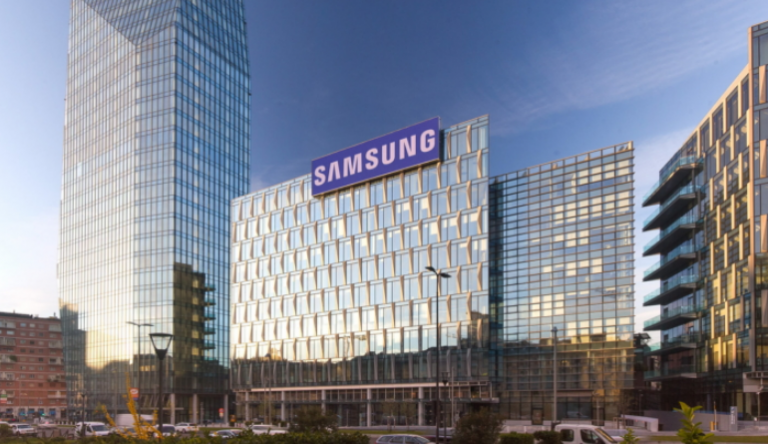 INFRA
INFRA
 INFRA
INFRA
 INFRA
INFRA
Shares of Samsung Electronics Co. Ltd. were trading lower late today after the company delivered its weakest annual earnings in more than a decade, with its operating profit falling by 3% from a year earlier.
The company reported fourth-quarter revenue of 67.8 trillion won (about $51 billion), down 4% from a year earlier and just below the analyst target of 69.3 trillion won. All told, Samsung delivered an operating profit of 2.82 trillion won, lower than the 3.43 trillion won forecast.
The news wasn’t entirely unexpected, as the world’s biggest memory chip maker and smartphone manufacturer warned investors in its earnings guidance earlier this month that it was expecting a big decline in profitability. One year earlier, the company had reported an operating profit of 4.31 trillion won.
For the full year, Samsung delivered 258.93 trillion won in revenue, down 14% from a year earlier, while its operating profit dipped to just 6.56 trillion won, down 85%. It’s the first time since 2008 that the company delivered less than 10 trillion won in annual operating profit.
In a statement, Samsung said its revenue and operating profit had actually improved on a sequential basis, thanks to a recovery in prices of dynamic random-access memory chips and ongoing strength with regard to its premium display products and smartphones.
Although most consumers know Samsung as the world’s top smartphone brand and a supplier of household appliances, the company derives the bulk of its revenue from sales of memory chips. It’s the world’s largest maker of DRAM chips, which are found in electronics ranging from PCs to smartphones, to cars and smart TVs.
The company’s reliance on memory chips means that it inevitably suffers whenever there is low demand for silicon products. The chipmaking industry is often characterized as a rollercoaster – and this was quite evident during the COVID-19 pandemic, when sales exploded, only to collapse as the world emerged out of lockdown.
Demand for memory chips dropped because of inflationary pressures and a poor economy, which led to consumers holding off on smartphone and PC purchases. At the same time, many manufacturers of those products canceled or delayed new orders for memory chips in order to work through a backlog of stockpiled inventory. As a result, memory chip prices have fallen dramatically over the past year. That was noticeable three months ago, when Samsung revealed that its operating profit fell 78% in the third quarter.
The good news is that Samsung believes the memory chip market is beginning to rebound, with global PC sales finally returning to growth during the fourth quarter, following almost two years of decline. The memory chip business generated 21.7 trillion won in revenue, though it delivered an operating loss of 2.18 trillion won.
However, the DRAM business within that segment actually delivered a profit during the quarter, following four quarters of losses. Officials said the recovery was driven by a rebound in demand for memory chips used in PCs, mobile devices and generative artificial intelligence servers.
The company also reported increased sales of premium products such as its high bandwidth memory chips, which are used in AI servers, and double-data rate 5 products. “The memory market and demand for IT are expected to continue recovering in 2024, though macroeconomic uncertainties remain to be seen,” Samsung said in its earnings statement.
Samsung is notably one of just a handful of chipmakers that manufacture premium HBM chips, so it’s poised to benefit from the rising demand for hardware that can power AI workloads. The company may also benefit from its upcoming two-nanometer chips, which are set to launch in early 2025. Its current generation memory chips use a three-nanometer process.
Samsung’s smartphone business has also suffered greatly over the last year, as the company recently lost its crown as the world’s top manufacturer by volume to Apple Inc. Previously, Samsung had held onto that top spot for over a decade.
Samsung Electronics’ mobile and other device business posted 39.5 trillion won in sales and 2.6 trillion won in operating profit. Within that segment, smartphone revenue decreased due to what Samsung said was sluggish sales during the quarter, though it pointed to solid demand for its latest tablets and wearable products.
The company is hopeful that its newest flagship smartphone, the Samsung Galaxy S24, will help to improve sales later this year. That new model represents a big evolution, as one of the world’s first smartphones to embrace advanced generative AI features, though it remains to be seen how consumers will react. But so far, so good, Samsung said, noting that it has already taken more than 1.21 million pre-orders for the S24 in its home market of South Korea.
Today’s report also revealed declining revenues in Samsung’s display, home appliances and smart TV businesses, which were blamed on waning market demand and intensified competition.
Holger Mueller of Constellation Research Inc. said Samsung’s profitability was due to the fact that it’s three major businesses, namely memory chips, smartphones and displays, were all in trouble and therefore unable to compensate for each other’s bad performance, as is normally the case. “The chronic weakness in memory chips, coupled with sluggish smartphone and display sales,” were the reasons for the company’s disappointing profits, he said.
“The good news for investors is that it’s clear better days are coming, and things are expected to look up for Samsung in 2024,” the analyst added.
On the other hand, investors may be pleased to see that the company stepped up its research and development investments, spending 7.55 trillion won on such endeavors during the quarter, a new company record.
Amid persistent global macroeconomic headwinds, Samsung said it’s expecting only a “moderate improvement” in its earnings for the first six months of the year, before seeing a “more significant improvement” in the second half.
THANK YOU